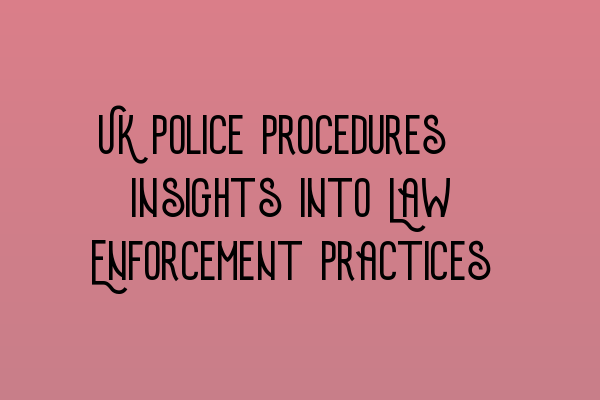UK Police Procedures: Insights into Law Enforcement Practices
Welcome to our blog post discussing UK police procedures and providing valuable insights into the practices followed by law enforcement agencies. In this article, we will shed light on various aspects of police procedures, ensuring a comprehensive understanding of the topic. As SQE Criminal Law & Practice Law UK solicitors, we are well-versed in these procedures and are here to guide you every step of the way.
Understanding UK Police Procedures
UK police procedures play a crucial role in maintaining law and order within society. Whether you are studying for the SQE 1 or SQE 2 exams, having a solid understanding of these procedures is essential. Let’s delve into the key aspects:
1. Arrest Procedures
When a crime is committed, the police have the power to arrest individuals suspected of wrongdoing. They must follow strict guidelines to ensure the arrest is lawful and adheres to human rights principles. To gain a better understanding of this topic, check out our article on SQE 1 Practice Exam Questions.
2. Investigative Procedures
Once an arrest is made, the police begin their investigation to gather evidence and build a case. This involves interviewing witnesses, collecting forensic evidence, and analyzing crime scenes. For more insights into investigative procedures, our article on SQE 1 Practice Mocks FLK1 FLK2 provides valuable tips and resources.
3. Custody Procedures
When an individual is arrested, they may be held in police custody. This involves certain protocols to safeguard the rights and well-being of the arrested person. Understanding custody procedures is crucial for aspiring solicitors. Make sure to explore our comprehensive guide on SQE 2 Preparation Courses to enhance your knowledge.
4. Interviewing Techniques
Interviewing suspects, witnesses, and victims is a key element of police procedures. Effective interviewing techniques help gather accurate information and ensure fair treatment of individuals involved in a case. To learn more about this topic, our article on SQE 1 Preparation Courses offers valuable insights and practical advice.
5. Evidence Handling
Proper handling of evidence is vital to maintain its integrity and admissibility in court. Police officers follow specific procedures when collecting, storing, and presenting evidence. To stay updated on SRA SQE exam dates and enhance your knowledge on evidence handling, visit our article on SRA SQE Exam Dates.
Conclusion
Understanding UK police procedures is not only crucial for aspiring solicitors but also for anyone interested in the legal field. These procedures ensure the fairness and effectiveness of the criminal justice system. We hope this article has provided valuable insights into the various aspects of law enforcement practices in the UK.
For more information and resources on preparing for the SQE exams, visit our website and explore our wide range of courses and practice materials. Feel free to contact SQE Criminal Law & Practice Law UK for any legal assistance or guidance you may require.
